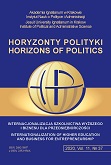Strategiczna rola inteligencji wielorakich w procesie zarządzania wiedzą
The Strategic Role of Multiple Intelligences in the Management of Knowledge
Author(s): Justyna DomanowskaSubject(s): Higher Education , Management and complex organizations, Sociology of Education
Published by: Uniwersytet Ignatianum w Krakowie
Keywords: intelligence; Howard Gardner; multiple intelligences; optimization of the education process; knowledge management;
Summary/Abstract: RESEARCH OBJECTIVE: The research objective of the article is to determine the distribution of multiple intelligences among first year students. THE RESEARCH PROBLEM AND METHODS: The main research problem undertaken in this paper concerned the existence of a correlation between the intelligence profile and the group profile. The existence of similarities among the intelligence profiles of first year students. Several specific questions were posed in order to find the averaged intelligence distribution, dominant intelligences, correlations between individual intelligences, and possible differences between groups. The method used to conduct the research was a questionnaire. The research was carried out on a voluntary basis and on the basis of self assessment according to questions suggested in one of the references. THE PROCESS OF ARGUMENTATION: There are many theories about intelligence, ways of measuring, and factors determining it. In this article, apart from presenting the main theories, Howard Gardner’s theory of multiple intelligences will be described in more detail. According to this theory, there is an unknown number of human abilities, from musical intelligence to the intelligence required to understand oneself. Each intelligence activates or triggers some kind of internal or external stimulus. It is important for students to be aware of the type of effective learning style they have. It allows to identify their strengths and use them in the process of knowledge acquisition. RESEARCH RESULTS: The analysis of the conducted research showed interesting correlations between the intelligences and similarities between the group profiles. CONCLUSIONS, INNOVATIONS, AND RECOMMENDATIONS: The studies are pilot studies and should be deepened and expanded in the future. According to the author, they should influence the way knowledge is managed.
Journal: Horyzonty Polityki
- Issue Year: 11/2020
- Issue No: 37
- Page Range: 83-97
- Page Count: 15
- Language: Polish

